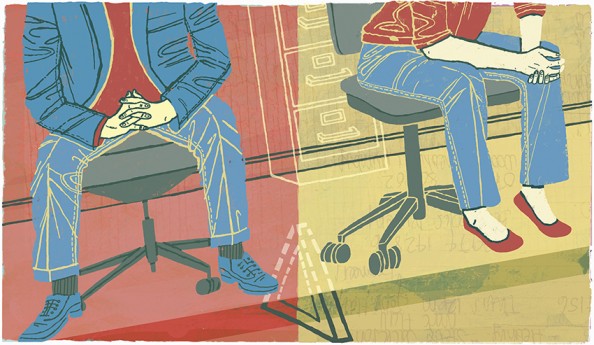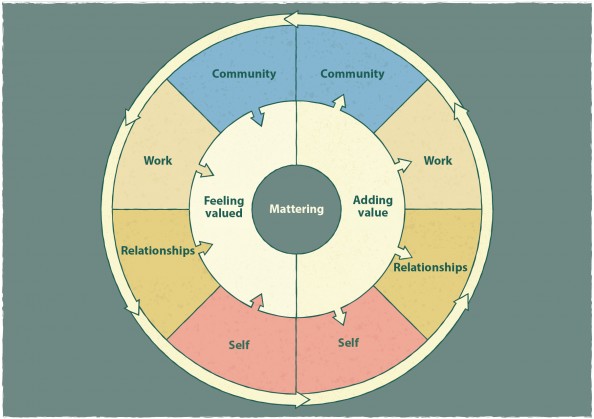A high employment rate is one reason for the success of the Nordic welfare state. But for those who have dropped out of the labour force, it can be a long road back. It is time to take a new approach to helping people return to the workplace.

Figure 1 Illustration: Eva Bee / NTB
Article 10 of the Norwegian Constitution requires the government to ‘create conditions under which every person capable of work is able to earn a living through their work or enterprise’. This right to work is a cornerstone of the welfare state. However, the design of the various welfare schemes often depends on a broad range of considerations, and differences in political ideology often underlie the choices that are made.
In recent years, politicians have argued that too few demands are placed on welfare recipients and that the duty to be active should be given higher priority in the return-to-work measures offered by the Norwegian Labour and Welfare Administration (NAV). This is an expression of society’s expectation that welfare recipients must contribute to society on par with everyone else. While Article 110 of the Norwegian Constitution imposes requirements on the state, politicians have shifted the responsibility onto the individual. The Constitution implies a right, while politicians talk about duties.
Do return-to-work measures help?
A duty to be active does not guarantee good results. According to an article in NAV’s professional journal Arbeid og velferd (‘Work and welfare’), the most crucial factor is how this ‘duty’ is practised (1). The literature shows, though, that on the whole, very few return-to-work programmes have proven to be effective (2). One problem is that individual measures seldom take into account the relationship between an employee’s health resources on the one hand and labour force requirements on the other (3). Since return-to-work programmes mainly target welfare recipients, the measures seem to rest on a theory that individuals are the cause of their own unemployment. This harkens back to Margaret Thatcher’s philosophy that poverty is a personality defect (4).
While Article 110 of the Norwegian Constitution imposes requirements on the state, politicians have shifted the responsibility onto the individual
However, research suggests that an exclusionary labour market is the main reason more people are unemployed. It is also the cause of changes in the proportion of disability pensioners over time in the population, which is summarised in John Gunnar Mæland’s book Trygd eller arbeid? (‘Welfare or work?’) (5). In today’s labour market, success often depends on having both formal and informal competence and a high level of personal suitability. As long as no structural measures are in place to make working life accessible to more people, it will be difficult to get more people to join the labour force, no matter how much pressure individuals are subjected to (5).
Requirements and duties
Although the exclusionary labour market is the main cause of unemployment, we need programmes and measures at the individual level. But is it beneficial for people who have dropped out of the labour force due to illness to be faced with requirements and duties?
Research indicates that an exclusionary labour market is the main reason more people are unemployed
As a general practitioner and psychiatrist with extensive experience, I have seen many patients who have not succeeded in working life for social, economic and health reasons. Many have had a difficult childhood and social problems throughout their school years, and thus have not managed to get occupational training. These patients often experience psychological stress, physical pain and fatigue, and they struggle with interpersonal conflicts. They suffer from a lack of recognition, a sense of worthlessness, and most believe they are not as valuable as other people.
Mattering – feeling valued and adding value
If return-to-work measures for such patients are to succeed, I believe we must start with mattering. We must show patients who have failed to enter the labour force or who have dropped out that they matter, and we must help them to feel that they have a value – human dignity. Everyone needs to feel valued in addition to their contribution to the labour force. If a person does not feel valued, it is difficult to imagine that they will be able to add value (6).
By placing requirements on a person, the implication is that they have a debt to settle. When we impose duties on others, are we not then underscoring a belief that their moral standards are not high enough? Thus, we risk compounding the sense of worthlessness in people for whom this is the most fundamental challenge (6).
In my view, there is reason to question the use of requirements and duties as the political and professional basis for return-to-work programmes in NAV. Two prominent Norwegian doctors, specialist in occupational medicine Ebba Wergeland and general practitioner Gisle Roksund, have pointed out that the Norwegian workfare policy, which is based on the rhetoric of requirements and duties, has reintroduced shame into the welfare system (7, 8). If there is one thing people who feel devalued do not need, it is more shame.
The topic of requirements and duties in my work with NAV on patients represents a challenge for me in terms of my professional ethics and medical practices. The concept of mattering from psychology highlights the crux of the problem with using requirements and duties in our interactions with vulnerable patients (6). The concept describes an ideal psychological condition in which two psychological experiences complement each other. On the one hand, feeling valued, and on the other hand, adding value (Figure 2). The two aspects of this concept are interdependent and must be balanced against each other.

Figure 2 Illustration of two complementary psychological experiences: On the one hand, a person needs to feel valued by receiving recognition from their community, work, relationships and oneself. On the other hand, a person needs to feel that they can add value. The figure is taken from the work of Dr Issac Prilleltensky (6).
In order to add value, people must believe that they have value (6). All of us need recognition from our community, workplace, relationships and ourselves. If you are a stateless refugee, you may feel your situation is dire even though you have friends. Being at the top of your class does not help if you are excluded socially. However, being able to add value in various areas of life is crucial. Most people have a strong desire to work, contribute to society by paying taxes, ensure that their family and friends have a good life, and have the capacity to take care of their own health and welfare (6).
In my view, there is reason to question the use of requirements and duties as the political and professional basis for return-to-work programmes in NAV
Isaac Prilleltensky, a prominent researcher on the conceptual framework of mattering (6), provides convincing evidence that feeling valued and adding value to society is a basic human need. His views are also supported by other recognised theories. In attachment theory, a key tenet is the importance of being cared for as a child. Early attachment to others, feeling that we are valuable, is crucial for our survival and our emotional and social development, as well as for our future ability to form relationships and good mental health. Other well-established psychological theories also emphasise our universal need to add value, make a contribution and have significance for others. The Act-Belong-Commit (ABC) campaign for better mental health also stresses the importance of commitment for good mental health (9). In addition, theories on autonomy, belief in one’s own coping ability, and a sense of meaning in life underscore the importance of mattering and the need to add value (6).
Serious consequences
When politicians use words such as requirement and duty, and NAV employs language that suggests condescension, prejudice and unequal human worth, I do not think we achieve what we are seeking: to enable more people to re-join the labour force. This kind of language and measures based on a requirement and duty ideology can hardly be considered motivational. When such measures work, I suspect they so do in spite of the requirements and duties because skilled professionals manage to downplay the elements of devaluation, punishment and sanctions when working with vulnerable service users.
When people feel they do not matter, they may react with both depression and aggression
Moreover, the rhetoric and ideology behind this can have a more far-reaching, negative impact on society if applied in a broader context. It is tempting to refer to social developments in the United States. When people feel they do not matter, they may react with both depression and aggression (6). It is also worth noting that the prevalence of mental health disorders has increased significantly in Norwegian adolescents and young adults in recent years (10, 11), and that mental health disorders are the main cause of work-related disability in Norway (12).
Thus, when vulnerable population groups feel devalued and worthless, this can have serious consequences for society. At the individual level, it can result in low functional ability with regard to employment, mental illness, self-harm, substance abuse, personality disorders and, in the worst case, anti-social and destructive behaviour such as violence against others, vandalism, truancy, theft and carrying weapons (6).
New basis for return-to-work programmes?
Giving people recognition and experiences that show they matter should become a new political, professional and scientific basis for NAV. This will create a framework that ensures a balance between people’s need to feel valued and to add value on the one hand, and their rights and responsibilities on the other. Further, the theory builds on key values that should serve as the basis for all interactions between people in NAV and the health services. In addition to establishing a new professional and scientific basis for NAV’s efforts with return-to-work programmes for individuals, structural measures must also be implemented to make working life more inclusive. But that is another issue.